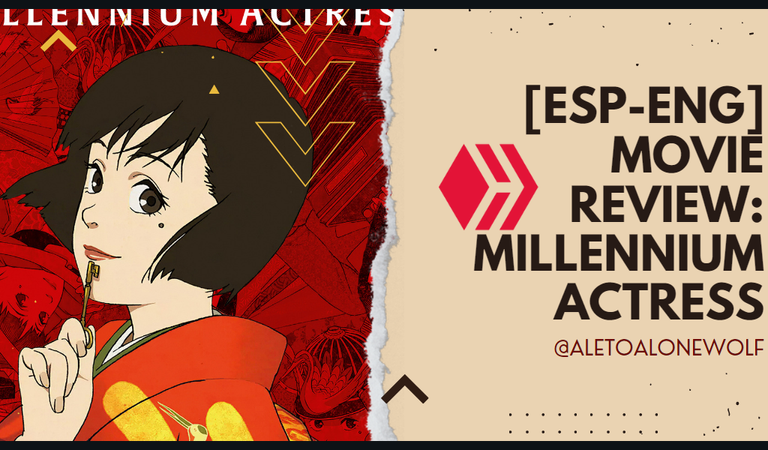[Esp - Eng] Movie Review: Millennium Actress

“Millennium Actress” es una película dirigida por Satoshi Kon y estrenada en el año 2001. Es un homenaje al cine japonés y a las actrices que lo protagonizaron. La protagonista de la película, Chiyoko Fujiwara, está inspirada en las vidas de Setsuko Hara, una de las actrices más famosas de su tiempo, la cual se retiró en una de sus mejores etapas.

Setsuko Hara (1920-2015) fue una actriz que trabajó con directores como Yasujiro Ozu, Akira Kurosawa y Mikio Naruse, entre otros. Su rostro y su presencia transmitían una mezcla de inocencia, optimismo y melancolía. Se retiró del cine a los 42 años, en 1962, y se convirtió en una figura misteriosa y solitaria, igual que la protagonista de esta historia.
La película tiene un estilo de animación muy dinámico y fluido, que se adapta a las diferentes épocas y géneros que retrata. El director Satoshi Kon usó técnicas como el match cut o el smear para crear transiciones suaves y efectos visuales impactantes. La música fue compuesta por Susumu Hirasawa, que colaboró con Satoshi Kon en todas sus películas. La banda sonora combina elementos electrónicos, orquestales y étnicos, creando una atmósfera envolvente y emotiva.
Millennium Actress " is a film directed by Satoshi Kon and released in 2001. It is a tribute to Japanese cinema and the actresses who starred in it. The film's protagonist, Chiyoko Fujiwara, is inspired by the lives of Setsuko Hara, one of the most famous actresses of her time, who retired in one of her prime.
Setsuko Hara (1920-2015) was an actress who worked with directors such as Yasujiro Ozu, Akira Kurosawa and Mikio Naruse, among others. Her face and presence conveyed a mixture of innocence, optimism and melancholy. He retired from cinema at the age of 42, in 1962, and became a mysterious and lonely figure, just like the protagonist of this story.
The film has a very dynamic and fluid animation style, which adapts to the different eras and genres it portrays. Director Satoshi Kon used techniques such as match cut or smear to create smooth transitions and stunning visual effects. The music was composed by Susumu Hirasawa, who collaborated with Satoshi Kon on all his films. The soundtrack combines electronic, orchestral and ethnic elements, creating an enveloping and emotional atmosphere.
Sinopsis/Synopsis

Hace treinta años, Chiyoko Fujiwara fue la estrella más importante del cine japonés, pero, de repente, desapareció. Uno de sus mayores admiradores, el realizador de documentales Genya Tachibana, viaja hasta el apartado refugio de montaña en el que vive para entrevistarla. Una vez allí, entrega a su ídolo de juventud una vieja llave que encontró entre los restos de su antiguo estudio. Como si la llave hubiera abierto las puertas de su memoria, Chiyoko comienza a recordar la historia de su vida. De esta forma, viaja desde el remoto pasado hasta el distante futuro a través de mil años, traspasando la frontera que separa la realidad de las películas que han formado gran parte de su vida...
Thirty years ago, Chiyoko Fujiwara was the biggest star in Japanese cinema, but suddenly she disappeared. One of her greatest admirers, documentary filmmaker Genya Tachibana, travels to the remote mountain hut where she lives to interview her. Once there, he gives his youthful idol an old key he found in the remains of her old studio. As if the key had opened the doors of her memory, Chiyoko begins to recall the story of her life. In this way, she travels from the remote past to the distant future through a thousand years, crossing the border that separates reality from the movies that have formed a large part of her life....
Critica/Review

La película es impresionante en varios aspectos, principalmente en su animación dinámica y forma de contar la historia. Se me hizo extraño el como el entrevistador y el camarografo interactuan en el recuerdo de Chiyoko, como si fuesen parte de la película de su vida (en efecto así es). Chiyoko vive a través de sus películas, cómo su amor por un hombre desconocido la impulsa a seguir adelante, cómo su vida se entrelaza con la historia de Japón y cómo su memoria se transforma con el tiempo.
La llave es el MacGuffin de la película “Millennium Actress”. Un MacGuffin es un elemento de suspense que hace que los personajes avancen en la trama, pero que puede tener o no mayor relevancia en la trama en sí. En este caso, la llave es el símbolo del amor que Chiyoko siente por el hombre misterioso, que resulta ser un disidente político perseguido por el régimen militar japonés. La llave le abre la puerta a un mundo de aventuras y fantasías, donde ella lo busca a través de diferentes épocas y películas. La llave también representa el misterio que rodea a su vida y a su carrera, ya que nunca revela su verdadero significado ni su dueño. La llave es, en definitiva, la motivación de Chiyoko para vivir y actuar, y el hilo conductor de su historia. Esto puede ser un aspecto interesante pro a la par negativo, pues todo se vuelve un poco melodramático, y algo exagerado, todo se resume en un amor imposible que al igual que Chiyoko, poco o nada sabemos de él.
El director se le conoce por realizar películas en las que se juega mucho con la realidad y lo que se percibe, esta no es la excepción, la película puede resultar confusa y difícil de seguir para algunos espectadores, ya que mezcla realidad y ficción de una forma no lineal y sin avisar. A veces no se sabe si lo que se ve es un recuerdo, una película o una fantasía.
The film is impressive in several aspects, mainly in its dynamic animation and storytelling. I found it strange how the interviewer and cameraman interact in Chiyoko's memory, as if they were part of the film of her life (indeed they are). Chiyoko lives through her films, how her love for an unknown man drives her on, how her life is intertwined with the history of Japan, and how her memory transforms over time.
The key is the MacGuffin in the film "Millennium Actress." A MacGuffin is an element of suspense that moves the characters forward in the plot, but may or may not have major relevance to the plot itself. In this case, the key is the symbol of Chiyoko's love for the mystery man, who turns out to be a political dissident persecuted by the Japanese military regime. The key opens the door to a world of adventure and fantasy, where she searches for him through different eras and films. The key also represents the mystery surrounding her life and career, as she never reveals its true meaning or owner. The key is ultimately Chiyoko's motivation for living and acting, and the common thread of her story. This can be an interesting but at the same time negative aspect, as everything becomes a bit melodramatic, and somewhat exaggerated, it all boils down to an impossible love that like Chiyoko, we know little or nothing about.
The director is known for making films that play a lot with reality and what is perceived, this is no exception, the film can be confusing and difficult to follow for some viewers, as it mixes reality and fiction in a non-linear and unannounced way. Sometimes you don't know if what you see is a memory, a movie or a fantasy.
Calificación/Rating

El mensaje de la película es difícil de resumir en pocas palabras, ya que depende de la interpretación de cada espectador. Sin embargo, se podría decir que la película nos habla de la pasión por el cine, el amor, la búsqueda de la felicidad, la identidad, el destino y la memoria. La película nos muestra cómo Chiyoko vive a través de sus películas, cómo su amor por un hombre desconocido la impulsa a seguir adelante, cómo su vida se entrelaza con la historia de Japón y cómo su memoria se transforma con el tiempo. La película nos invita a reflexionar sobre el significado de nuestra propia vida, sobre lo que nos motiva, sobre lo que recordamos y sobre lo que olvidamos. La película nos hace sentir que la vida es una aventura maravillosa y que el cine es una forma de arte que nos permite vivirla de muchas maneras.
No pude evitar pensar en mi, y que es o fue lo que me motivo a gran parte de las cosas que hago hoy día. Recuerdo que a los 13 años aprendía tocar la guitarra con el fin de impresionar a una chica, luego a los 17 escribí mis primeras canciones para dedicarselas a otra chica, y hace poco había escrito cuentos por otra chica más. Mis motivaciones en la vida habían sido influenciadas por entes externos, a medida que el tiempo y las cosas pasaron, fui descubriendo dichas pasiones por mi cuenta, volviendose un pilar fundamental de mi personalidad.
Para concluir, a la película le doy una calificación de 7.3, reconozco que no es una película para todos, ni siquiera para los amantes del anime. Sin embargo, es una película buena para pasar una tarde, aunque habría que verla varias veces para comprenderla mejor. Sin más que agregar, me despido.
The message of the film is difficult to summarize in a few words, as it depends on the interpretation of each viewer. However, it could be said that the film tells us about the passion for cinema, love, the search for happiness, identity, destiny and memory. The film shows us how Chiyoko lives through her films, how her love for an unknown man drives her forward, how her life intertwines with the history of Japan and how her memory transforms over time. The film invites us to reflect on the meaning of our own lives, what motivates us, what we remember and what we forget. The film makes us feel that life is a wonderful adventure and that cinema is an art form that allows us to live it in many ways.
I couldn't help but think of myself, and that it is or was what motivated me to do most of the things I do today. I remember when I was 13 years old learning to play the guitar in order to impress a girl, then at 17 I wrote my first songs to dedicate to another girl, and recently I had written short stories for yet another girl. My motivations in life had been influenced by external entities, as time and things happened, I discovered these passions on my own, becoming a fundamental pillar of my personality.
To conclude, I give the movie a rating of 7.3, I recognize that it is not a movie for everyone, not even for anime lovers. However, it is a good movie to spend an afternoon, although you would have to watch it several times to understand it better. Without further ado, I bid you farewell.
Translated with www.DeepL.com/Translator (free version)
Referencias/Source
https://cinemagavia.es/millennium-actress-pelicula-critica/
https://www.elantepenultimomohicano.com/2021/03/critica-millennium-actress.html
https://www.espinof.com/animacion/millennium-actress-un-viaje-apasionante
https://freakelitex.com/millennium-actress-resena-anime/
https://www.filmaffinity.com/es/movie-awards.php?movie-id=350880
https://lwlies.com/articles/millennium-actress-satoshi-kon-cinema-love-letter/

Y eso que dices al final te iba yo a decir: de lo complicada que es habría que verla en repetidas ocasiones. Pero si que interesante resultó ser esta linda película. Gracias por la narrativa de los hechos mi estimado Jesús 🤝
La película requiere ser vista varias veces, es interesante por todos los matices y demás elementos. Gracias por tu visita al blog.